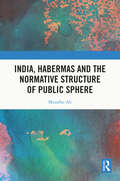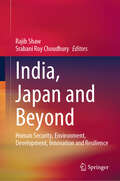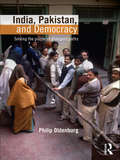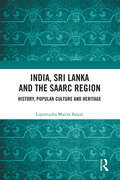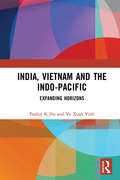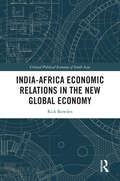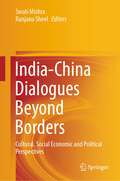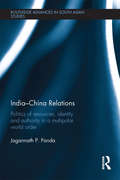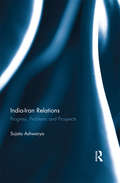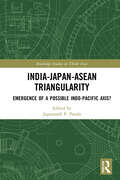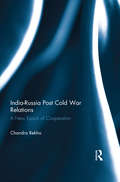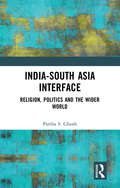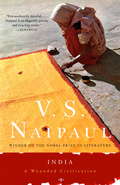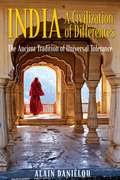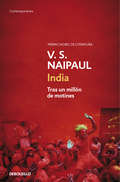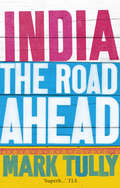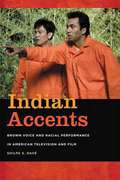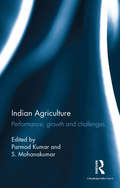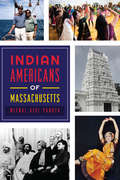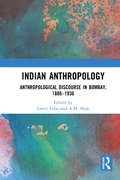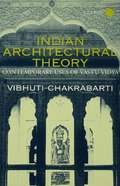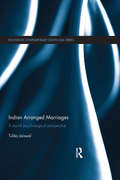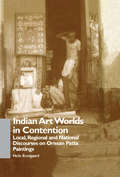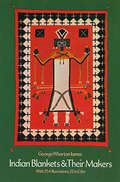- Table View
- List View
India, Habermas and the Normative Structure of Public Sphere
by Muzaffar AliThis book examines how the contemporary Indian situation poses a strict theoretical challenge to Habermas’s theorization of the public sphere and employs the method of samvāda to critically analyse and dissect its universalist claims. It invites the reader to consider the possibility of imagining a normative Indian public sphere that is embedded in the Indian context—in a native and not nativist sense—to get past the derivative language of philosophical and political discourses prevalent within Indian academia. The book proposes that the dynamic cooperative space between Indian political theory and contemporary Indian philosophy is effectively suited to theorize the native idea of the Indian public sphere. It underlines the normative need for a natively theorized Indian public sphere to further the multilayered democratization of public spheres within diverse communities that constitute Indian society. The book will be a key read for contemporary studies in philosophy, political theory, sociology, postcolonial theory, history and media and communication studies.
India, Japan and Beyond: Human Security, Environment, Development, Innovation and Resilience
by Rajib Shaw Srabani Roy ChoudhuryJapan–India relations have traversed from "distantly friendly" to "indispensable partners." The significant development of the India-Japan strategic partnership, the convergence of bilateral strategies, and the addressing of broader economic relations and cultural dimensions signify that bilateral relations have entered a "new era" in Japan-India relations. Given the region's emerging geopolitics, diplomatic relations between these two nations have gained momentum beyond the traditional pillars of engagement. New dimensions, namely, human security, environment, disaster risk reduction, climate change issues, innovation, and resilience building have gained currency. Addressing these, this book covers the broader aspects of human security dimensions of India-Japan collaboration. Involving multi and trans-disciplinary research, including in-depth reviews and new data based on case studies from India and Japan, this book sheds light on new convergence frontiers between these two nations. Furthermore, the book suggests specific policy and action measures to enhance human security through the bilateral cooperation between India and Japan, which has a global impact.
India, Pakistan, and Democracy: Solving the Puzzle of Divergent Paths
by Philip OldenburgThe question of why some countries have democratic regimes and others do not is a significant issue in comparative politics. This book looks at India and Pakistan, two countries with clearly contrasting political regime histories, and presents an argument on why India is a democracy and Pakistan is not. Focusing on the specificities and the nuances of each state system, the author examines in detail the balance of authority and power between popular or elected politicians and the state apparatus through substantial historical analysis. India and Pakistan are both large, multi-religious and multi-lingual countries sharing a geographic and historical space that in 1947, when they became independent from British rule, gave them a virtually indistinguishable level of both extreme poverty and inequality. All of those factors militate against democracy, according to most theories, and in Pakistan democracy did indeed fail very quickly after Independence. It has only been restored as a façade for military-bureaucratic rule for brief periods since then. In comparison, after almost thirty years of democracy, India had a brush with authoritarian rule, in the 1975-76 Emergency, and some analysts were perversely reassured that the India exception had been erased. But instead, after a momentous election in 1977, democracy has become stronger over the last thirty years. Providing a comparative analysis of the political systems of India and Pakistan as well as a historical overview of the two countries, this textbook constitutes essential reading for students of South Asian History and Politics. It is a useful and balanced introduction to the politics of India and Pakistan.
India, Sri Lanka and the SAARC Region: History, Popular Culture and Heritage
by Lopamudra Maitra BajpaiThis book examines the historical and socio-cultural connections across the SAARC region, with a special focus on the relationship between India and Sri Lanka. It investigates hitherto unexplored narratives of history, popular culture and intangible heritage in the region to identify the cultural parallels and intersections that link them together. In doing so, the volume moves away from an organised and authorised heritage discourse and encourages possibilities of new understandings and re-interpretations of cross-cultural communication and its sub-texts. Based on original ethnographic work, the book discusses themes such as cultural ties between India and Sri Lanka, exchanges between Arthur C. Clarke in Sri Lanka and Satyajit Ray in India, cultural connectivity reflected through mythology and folklore, the influence of Rabindranath Tagore on modern dance in Sri Lanka, the introduction of railways in Sri Lanka, narrative scrolls and masked dance forms across SAARC countries, Hindi cinema as the pioneer of cultural connectivity, and women’s writing across South Asia. Lucid and compelling, this book will be useful for scholars and researchers of cultural studies, South Asian studies, cultural anthropology, sociology, popular culture, cross-cultural communication, gender studies, political sociology, cultural history, diplomacy, international relations and heritage studies. It will also appeal to general readers interested in the linkages between India and Sri Lanka.
India, Vietnam and the Indo-Pacific: Expanding Horizons
by Pankaj K Jha Vo Xuan VinhThis book delves into the examination of bilateral relations between India and Vietnam in the 21st century and how the Indo-Pacific as a geo-political construct lends itself to the improvement of their engagement. With the rise and increasing assertiveness of China, the slow growth of the United States, the resurgence of Japan, and the oscillating role of ASEAN as a multilateral organization, the Indo-Pacific has emerged as a theatre of international geostrategic competition. This book studies these changing geopolitical realities and new evolving strategic configurations, while addressing political, economic, defence, and strategic aspects of the relationship along with the role of China and the US in facilitating ties. India’s Act East Policy that was upgraded from the Look East Policy – one of the main drivers for India’s increasing presence in the Asia-Pacific region – is also examined in this volume. An important intervention in the study of international relations, this book will be indispensable to students and researchers of maritime studies, security studies, politics and international relations, geopolitics, and Asian studies.
India-Africa Economic Relations in the New Global Economy (Critical Political Economy of South Asia)
by Rick RowdenWhile there have been many books about China’s growing economic role in Africa, this book explores the much less-well-known story of India’s growing economic role in Africa. And like the big debates about China’s role in Africa, this book similarly asks if India is acting as a helpful development partner in Africa, an exploitative “new colonizer,” or if the answer ultimately has to do with the degree of agency exercised by African governments.While the book documents the significant increase in Indian aid, trade, and FDI in Africa in the new millennium, it also offers much more. It comprehensively looks at theories of economic development, the debates about the role of trade and industrial policies in economic development strategies, colonial and post-colonial literature, and controversial features of today’s global political economy as the background to study Africa and frames Africa–ndia economic relations in these broad contexts. The book reviews the history of India’s diplomacy, trade, and investment in African countries since decolonization, with a focus on the increased economic ties of the past two decades. The main question examined is about the longterm impact that India’s economic relations are having in African economies, and if India is helping Africa to successfully develop over time, or not. The author examines India’s economic and strategic interests in the African region and offers a comparative analysis of Africa’s trade with India, China, the European Union, and other African nations. The book also explores a number of outstanding issues in India–frica relations today, such as Africa’s role as a source of oil, gas, and critical minerals needed by India, the lifesaving role of Indian generic medicines across the continent, the nature of the agricultural development model that India is introducing in Africa, and key areas where Indian and African governments are cooperating in the international arena.The book offers a critical and in-depth look into the partnerships India has developed with African countries and contributes to the debate on economic relations between a more developed emerging market like India and less developed countries. A major contribution to the emerging area of South–outh economics, this book –part of the Critical Political Economy of South Asia series –will be useful for scholars and researchers of economics, development economics, development studies, public policy, diplomacy, African studies, political economy, South Asian economics, and international politics and trade.
India-China Dialogues Beyond Borders: Cultural, Social Economic and Political Perspectives
by Ranjana Sheel Swati MishraThis book is a collection of contributions related to India–China relationship beyond the issue of borders. It focuses on those elements that play important role in defining, continuing, and strengthening the interaction between the two countries. In doing so, it explores roles of language and linguistics, history and culture, politics and economy, and philosophy and sociology that mediated ancient and modern interfaces. The book observes the role of silk route in the economic, political, and scholarly exchanges between ancient civilizations and in the movement of Buddhism to China and other Asian nations. The contributors highlight how the two countries have co-existed in various eras and tackled issues of conflict and cooperation during lows and highs in the past and present. It pays special attention to the role of language and linguistic competence as an important component of socio-cultural comprehension of a society and introduces major innovations and challenges in teaching and learning the Chinese language. The wide-ranging contributions make the book an attractive resource for academics, think-tanks, diplomats, and researchers working on Asian/India–China studies across the globe.
India-China Relations: Politics of Resources, Identity and Authority in a Multipolar World Order (Routledge Advances in South Asian Studies)
by Jagannath P. PandaThe rise of India and China as two major economic and political actors in both regional and global politics necessitates an analysis of not only their bilateral ties but also the significance of their regional and global pursuits. This book looks at the nuances and politics that the two countries attach to multilateral institutions and examines how they receive, react to and approach each other’s presence and upsurge. The driving theme of this book is to highlight the enduring and emerging complexities in India-China relations, which are multi-layered and polygonal in nature, and both a result and reflection of a multipolar world order. The book argues that coexistence between India and China in this multipolar world order is possible, but that it is limited to a medium-term perspective, given the constraints of identity complexities and global aspirations these two rising powers are pursuing. It goes on to discuss how their search for energy resources, quest to uphold their own identity as developing powers, and engagement in balance-of-power politics to exert authority on each other’s presence, are some elements that guide their non-cooperative relationship. By explaining the foreign policy approaches of Asia’s two major powers towards the growing Asian and global multilateralism, and highlighting the policies they carry towards each other, the book is a useful contribution to students and scholars of Asian Politics, Foreign Policy and International Relations.
India-Iran Relations: Progress, Problems and Prospects
by Sujata AshwaryaThis book examines India’s relationship with Iran since the post-World War II period and its unique search for meaningful bilateral ties in the West Asian region in the context of the changing regional and international scenarios. The four chapters highlight the achievements and constraints on the development of Indo-Iranian relations during the Cold War era; opportunities and limitations in bilateral engagements between India and Iran in the aftermath of the Cold War; impact of the ‘US factor’ on the development of crucial Indo-Iranian energy ties and the limitation imposed by India’s relations with Israel and Saudi Arabia on the India–Iran ties. More specifically, the four chapters touch on the central drivers—energy imports, access to Central Asia, cooperation in Afghanistan, mutual trade and economic investments and security ties—of India’s Iran policy, and how they structure India’s interaction with the other countries of the region and impact on the articulation of national interests. Combining a rich interplay of facts and figures with nuanced analyses, this volume will be a valuable resource for scholars, policymakers, diplomats and any interested reader desirous of knowing more about Indo-Iranian relations in particular and India’s West Asia policy in general. Please note: Taylor & Francis does not sell or distribute the Hardback in India, Pakistan, Nepal, Bhutan, Bangladesh and Sri Lanka
India-Japan-ASEAN Triangularity: Emergence of a Possible Indo-Pacific Axis? (Routledge Studies on Think Asia)
by Jagannath P. PandaThis book focuses on the scope, potential and future of the India-Japan-Association of Southeast Asian Nations (ASEAN) trilateral. Through this book, contributors examine the strategic and global partnership between India and Japan and the collaboration with ASEAN. Analysing contemporary strategic issues in the Indo-Pacific, the book takes up the complex link between security and economics. It offers a thorough understanding on how the major Asian powers, India and Japan, cooperate and coordinate with the ASEAN. It delves into few critical questions: Is there a scope for India-Japan-ASEAN triangularity in the Indo-Pacific? Can a formal or institutional cooperation be forged between these three actors? What specific cooperation could India and Japan forge with ASEAN as an institution? To what extent can each ASEAN member independently become a partner with India and Japan? A novel assessment of the post-pandemic economic and political balancing and restructuring, this book will be of interest to Asian politics, international relations, strategic studies, regional organizations in Asia and think tanks specializing in foreign policy, security studies, international trade and economics.
India-Russia Post Cold War Relations: A New Epoch of Cooperation
by Chandra RekhaPost Cold War international relations have undeniably been a litmus test for the bilateral relations between India and Russia. With the emergence of a new international system, the foreign policies of both countries vacillated to explore new avenues of partnerships with other international players, an opportunity that otherwise proved effective to a large extent. National priorities and the geo-political architecture remodelled by the US, thus, compelled New Delhi and Moscow to pursue a foreign policy that moved away from serving the interests of each other. While defining the trends in the bilateral relations between the two countries, the strategic community has questioned whether the relationship can remain as special and strategic as it had been in the past. Are both countries still as relevant to one another as they once were? <P><P>As the constant debate revolves around these questions, the two entities have, however, indicated a certain level of distinguishing characteristics in order to address the complexities and challenges in the partnership and have acknowledged that their relationship is not only special but also indispensable. What has also continued to remain undamaged and an integral part of the bilateral relations is mutual trust, understanding and concern, thus, resulting in maturity and pragmatism, irrespective of the uncertainties that the two countries face. It is in this context, that the new stage in the bilateral relations between the two countries requires a thorough assessment. It stands to reason that with the developments that are taking place in the current international milieu, there is a need for India and Russia to reemphasise their strong strategic partnership, goodwill and diplomatic trust that have stood the test of time. This book undertakes a serious assessment of the strategic partnership in the contemporary international set up. The seven chapters of the book attempt to address the myriad challenges through detailed analyses and evaluation of the partnership between India and Russia in various spheres, including the political, defence, economic, nuclear, energy, science and technology, security, and strategic engagement. <P><P>Please note: Taylor & Francis does not sell or distribute the Hardback in India, Pakistan, Nepal, Bhutan, Bangladesh and Sri Lanka
India-South Asia Interface: Religion, Politics and the Wider World
by Partha S. GhoshIndia-South Asia Interface raises the fundamental question: How does one make sense of South Asia? Conventional wisdom defines it primarily in terms of regional and international politics. The failures of the South Asian Association for Regional Cooperation (SAARC) are emblematic of that wisdom. Marking a departure from such approaches, Partha Ghosh makes the case that more than merely a political construct South Asia must be understood as a shared social consciousness. Through chapters that explore topics such as threats to democracy, religion and politics, the place of Kashmir, different conceptions of regionalism, the roles of America and China, and the issue of refugees and migrants, he demonstrates that there is no escape from reinventing the region from a people’s perspective. Only this way can South Asia retrieve its soul and replace its cynicism and despair with expectation and hope.Based primarily on Ghosh’s research articles and newspaper columns written over the last five years, the volume can be viewed as an intimate statement of his understanding of the region; an understanding that has matured through decades-long interactions with the region’s academics, politicians, and the so-called ‘man on the street’. In some sense, the volume is also a semi-autobiographical treatise, which spells out Ghosh’s systematic evolution as a confirmed South Asianist. The region’s destiny ought to be wrested, he therefore argues, from the hands of its political leaders and returned to the common men and women of the region. Please note: Taylor & Francis does not sell or distribute the Hardback in India, Pakistan, Nepal, Bhutan, Bangladesh and Sri Lanka.
India: A Wounded Civilization (Vintage International Ser.)
by V. S. NaipaulFrom the Nobel Prize-winning author comes a masterpiece of astonishing insight and candor about a society traumatized by centuries of foreign conquest and immured in a mythic vision of its past.&“Extraordinarily forceful.... Naipaul is an elegantly precise and exacting writer.&” –NewsweekIn 1975, at the height of Indira Gandhi&’s &“Emergency,&” V. S. Naipaul returned to India, the country his ancestors had left one hundred years earlier. Out of that journey he produced a vibrant, defiantly unsentimental portrait of India. Drawing on novels, news reports, political memoirs, and his own encounters with ordinary Indians—from a supercilious prince to an engineer constructing housing for Bombay&’s homeless—Naipaul captures a vast, mysterious, and agonized continent inaccessible to foreigners and barely visible to its own people. He sees both the burgeoning space program and the 5,000 volunteers chanting mantras to purify a defiled temple; the feudal village autocrat and the Naxalite revolutionaries who combined Maoist rhetoric with ritual murder. Relentless in its vision, thrilling in the keenness of its prose, India: A Wounded Civilization is a work of astonishing insight and candor.
India: The Ancient Tradition of Universal Tolerance
by Alain DaniélouA collection of Daniélou's writings that builds a bold and cogent defense of India's caste system• Looks at the Hindu caste system not as racist inequality but as a natural ordering of diversity• Reveals the stereotypes of Indian society invented to justify colonialism• Includes never-before-published articles by the internationally recognized Hindu scholar and translator of The Complete Kama Sutra (200,000 copies sold)In classical India social ethics are based on each individual's functional role in society. These ethics vary according to caste in order to maximize the individual's effectiveness in the social context. This is the definition of caste ethics. The Indian caste system is not a hierarchy with some who are privileged and others who are despised; it is a natural ordering, an organizing principle, of a society wherein differences are embraced rather than ignored. In the caste system it is up to the individual to achieve perfection in the state to which he or she is born, since to a certain extent that state also forms part of a person's nature. All people must accomplish their individual spiritual destinies while, as members of a social group, ensuring the continuity of the group and collaborating in creating a favorable framework for all human life--thereby fulfilling the collective destiny of the group. The notion of transmigration provides an equalizing effect on this prescribed system in that today's prince may be reborn as a woodcutter and the Brahman as a shoemaker.In India: A Civilization of Differences, Daniélou explores this seldom-heard side of the caste debate and argues effectively in its favor. This rare collection of the late author's writings contains several never-before-published articles and offers an in-depth look at the structure of Indian society before and after Western colonialism.
India: Tras un millón de motines
by V. S. NaipaulEl Premio Nobel de Literatura, V.S. Naipaul, nos sumerge en un apasionado y clarividente diario de viaje por la India, su país natal. Trazada sin prejuicios ni sentimentalismos, la visión lúcida, tierna y sarcástica de la India que ofrece V. S. Naipaul es una representación viva de una sociedad compleja en la que la modernidad se teje sobre un fondo tradicional. El enfrentamiento entre musulmanes e hindúes, las transformaciones del papel de la mujer, la supervivencia de los antiguos rituales, la dinámica industrial cinematográfica, la nueva literatura, los cambios en la institución familiar y la permanencia del sistema de castas son aspectos que no escapan a la aguda mirada del Premio Nobel de literatura. Reseña:«Por la abundancia de talento, difícilmente puede existir un escritor en la actualidad que supere a V. S. Naipaul.»The New York Times
India: the road ahead
by Mark TullySince the Indian economy was liberated from bureaucratic, socialist controls in 1991, it has developed rapidly. A country once renowned for the backwardness of its industries, its commerce and its financial market is now viewed as potentially one of the major world economies of the twenty-first century. But there are many questions which need to be asked about the sustainability of this rapid economic growth and its effect on the stability of the country. Have the changes had any impact on the poor and marginalised? Can India's democracy contain the mounting resentment of those left out of the new economic order? Can a high growth rate be sustained with India's notoriously corrupt and inefficient governance? Can the development of its creaking infrastructure be speeded up? How is India going to feed itself unless agriculture is reformed?This timely book will answer these questions through interviews with industrialists and cricketers, God men and farmers, plutocrats and former untouchables. Full of fascinating stories of real people at a time of great change, it will be of interest to economists, business people, diplomats, politicians, as well as to those who love to travel and who take an interest in the rapid growth of one of the world's largest countries, and what this means to us in the West.
Indian Accents: Brown Voice and Racial Performance in American Television and Film (The Asian American Experience)
by Shilpa S. DaveAmid immigrant narratives of assimilation, Indian Accents focuses on the representations and stereotypes of South Asian characters in American film and television. Exploring key examples in popular culture ranging from Peter Sellers' portrayal of Hrundi Bakshi in the 1968 film The Party to contemporary representations such as Apu from The Simpsons and characters in Harold and Kumar Go to White Castle, Shilpa S. Dave develops the ideas of "accent," "brownface," and "brown voice" as new ways to explore the racialization of South Asians beyond just visual appearance. Dave relates these examples to earlier scholarship on blackface, race, and performance to show how "accents" are a means of representing racial difference, national origin, and belonging, as well as distinctions of class and privilege. While focusing on racial impersonations in mainstream film and television, Indian Accents also amplifies the work of South Asian American actors who push back against brown voice performances, showing how strategic use of accent can expand and challenge such narrow stereotypes.
Indian Administration - Postgraduate course M.A. Public administration - Second year - Paper VIII - PPA 203
by Institute Of Distance Education University Of Madras ChennaiThe book "Indian Administration" is a comprehensive study material designed for second-year postgraduate students of Public Administration under the University of Madras. It covers the evolution, framework, and key structures of Indian administration, from ancient to contemporary times. Topics include the constitutional setup, federalism, central and state administrative frameworks, parliamentary democracy, and local governance. It addresses critical issues like minister-secretary relationships, corruption, and the impact of globalization and information technology on governance. With detailed analyses of historical periods and administrative reforms, it aims to equip learners with a nuanced understanding of India's administrative systems and challenges. Designed in a self-learning format, it is supported by model questions and key summaries to aid distance education students.
Indian Agriculture: Performance, growth and challenges. Essays in honour of Ramesh Kumar Sharma
by Parmod Kumar S. MohanakumarThis volume examines the transitions in Indian agriculture since the 1980s, and emphasizes upon the role of neoliberal policies and their impact. The essays presented here deal with a range of pertinent and contemporary issues, including global food security, livelihoods of agricultural labourers, and public and private investment. These weave together glimpses of the impasse faced by petty commodity producers (marginal and small farmers) and their subsequent economic distress and social exclusion. Comprehensive in analysis, this book will be useful to scholars and researchers of agricultural economics, political economy, political science and public policy.
Indian Americans of Massachusetts (American Heritage)
by Meenal Atul PandyaIndians are the most recent immigrants in Massachusetts. Though a tiny minority, their contributions are numerous and far-reaching. Swami Vivekananda arrived in Boston in 1893 and left a lasting legacy of Hindu philosophy. Sushil Tuli opened a unique community bank, Leader Bank, as the first and only minority-owned bank in the state of Massachusetts. The Deshpande Center for Technological Innovation at MIT, created with the grant of $20 million by Desh and Jaishree Deshpande, empowers MIT's researchers to make a difference in the world by developing innovative technologies. Author Meenal Atul Pandya details the influence of Indians on Massachusetts history.
Indian Anthropology: Anthropological Discourse in Bombay, 1886–1936
by Lancy LoboIndian Anthropology: Anthropological Discourse in Bombay 1886–1936 is an important contribution to the history of Indian anthropology, focusing on its formative period. It looks at the political economy of knowledge production and the anthropological discourse in Bombay during the late nineteenth century. This seminal volume highlights the much forgotten and ignored contribution of the Bombay Presidency anthropologists, many of whom were Indians, from different backgrounds, such as lawyers, civil servants, and men of religion, much before professional anthropology was taught in India. The other contributions are by pioneers from Bengal, Punjab, and United Provinces — all British administrators turned scholars. This volume is divided into three parts: Part I deals with the six contributions on the history of the development of anthropology in India; Part II deals with four contributions on the methodology and collecting ethnographic data; and Part III deals with four contributions on theoretical analysis of ethnographic facts. The roots of many contemporary conflicts and social issues can be traced to this formative period of anthropology in India. This book will be useful to students and researchers of anthropology, sociology, public administration, modern history, and demography. It will also be of interest to civil servants, students of history, Indian culture and society, religions, colonial history, law, and South Asia studies.
Indian Architectural Theory and Practice: Contemporary Uses of Vastu Vidya
by Vibhuti ChakrabartiIn this ground-breaking study the traditional Indian science of architecture and house-building,Vastu Vidya, is explored in terms of its secular uses, at the levels of both theory and contemporary practice. Vastu Vidya is treated as constituting a coherent and complete architectural programme, still of great relevance today. Chakrabarti draws on an impressive amount of textual material, much of it only available in Sanskrit, and presents several extremely valuable illustrations in support of the theories expounded. Each chapter deals with one architectural aspect, and chapters are divided into three sections. For each aspect, the first section explains the prescriptions of the traditional texts; the second section deals with the rather arbitrary use of that aspect by contemporary Indian architects trained in the western manner but striving to relate to Indian roots; while the last section in each chapter explores the selected use of that particular aspect by contemporary Vastu pundits, with their disregard for architectural idiom.
Indian Arranged Marriages: A Social Psychological Perspective (Routledge Contemporary South Asia Series)
by Tulika JaiswalDespite the fact that more than 80% of cultures practice varying degrees of arranged marriage, scholars have thus far concentrated exclusively on American and European cultures from choice marriages, not yet fully exploring the psychology of arranged marriages. India is a prominent South Asian nation that continues to retain the historical tradition of arranged marriages in the 21st century. This book therefore provides a timely addition to marital research as it offers a comprehensive and systematic psychological examination on Indian arranged marriages. This book explores the role of individual, interactional, contextual, and cultural factors in predicting marital satisfaction in individuals who were in arranged marriages and living in India. The discussion is drawn from a survey collecting data from individuals married through the arranged marriage system in India. In light of this empirical study, the book considers the cross-cultural applicability of Western findings and proposes some key methodological and clinical considerations for examining marital relationships in Indian arranged marriages. Providing useful, much-needed scholarly insight on arranged marriages and widening the research conceptualization of marriage, this book will be of particular interest to scholars of Social Psychology, Sociology, Marital and Cross-cultural studies.
Indian Art Worlds in Contention: Local, Regional and National Discourses on Orissan Patta Paintings (Nias Monographs #No.80)
by Helle BundgaardThis beautifully illustrated book explores the opinions of artists, critics and others involved with arts or crafts, arguing for a theory that considers the different discursive formations and related strategic practices of an art world. Focusing on Orissan patta paintings in India the author examines the local, regional and national discourses involved. In so doing, the text demonstrates that, while painters' local discourses are characterised by pragmatism, the discourses of regional and especially national elites are concerned with the exegesis of local paintings and their association with the great Sanskrit tradition A central theme of the study focuses on the awards given for skill in craft making and their changing significance as they pass from national and regional elites to local painters. It is shown how certain key actions by local painters result from a clash between local discourses on the one hand and regional and national discourses on the other.
Indian Blankets and Their Makers
by George Wharton JamesHistory, old-style wool blankets, changes brought about by traders, symbolism of design and color, a Navajo weaver at work, more. Emphasis on Navajo. Includes information on the Bayeta blanket, squaw dresses, dyeing, belts, garters, hair braids, imitation blankets, the Chimayó blanket, and reliable dealers. 254 illustrations, 32 in color.
